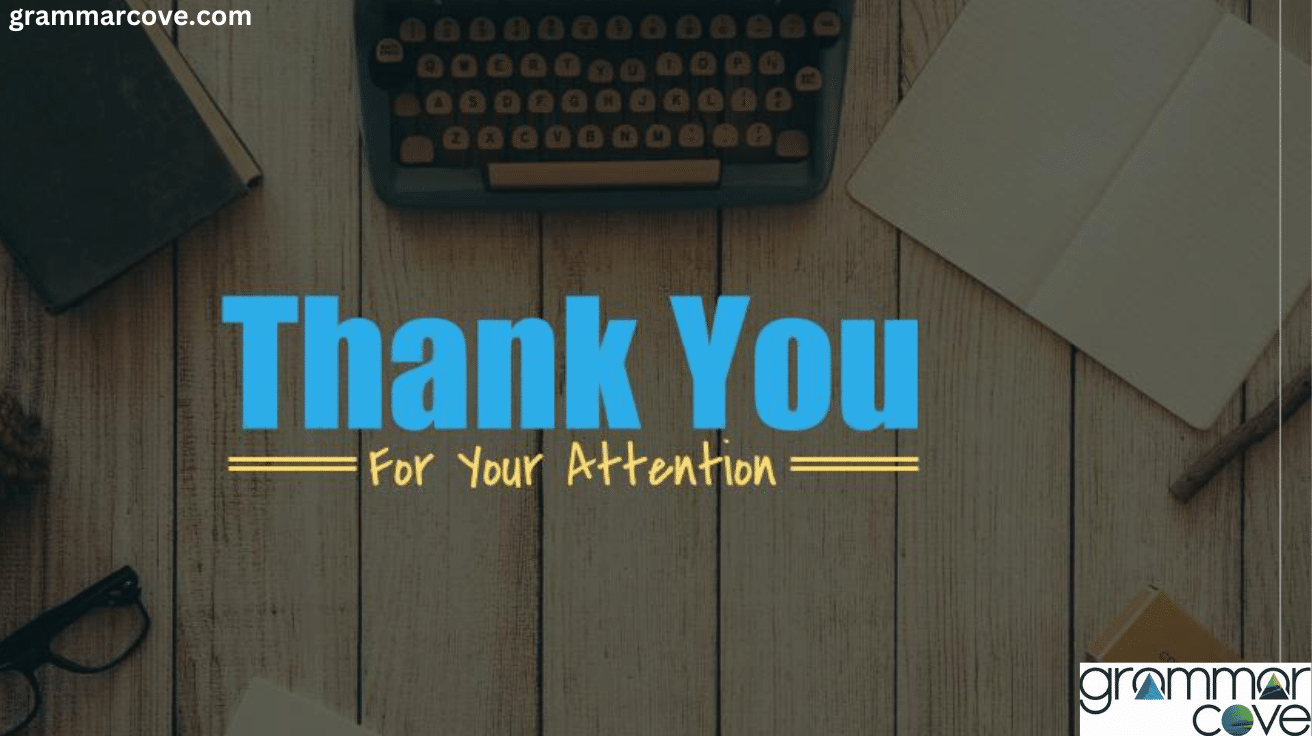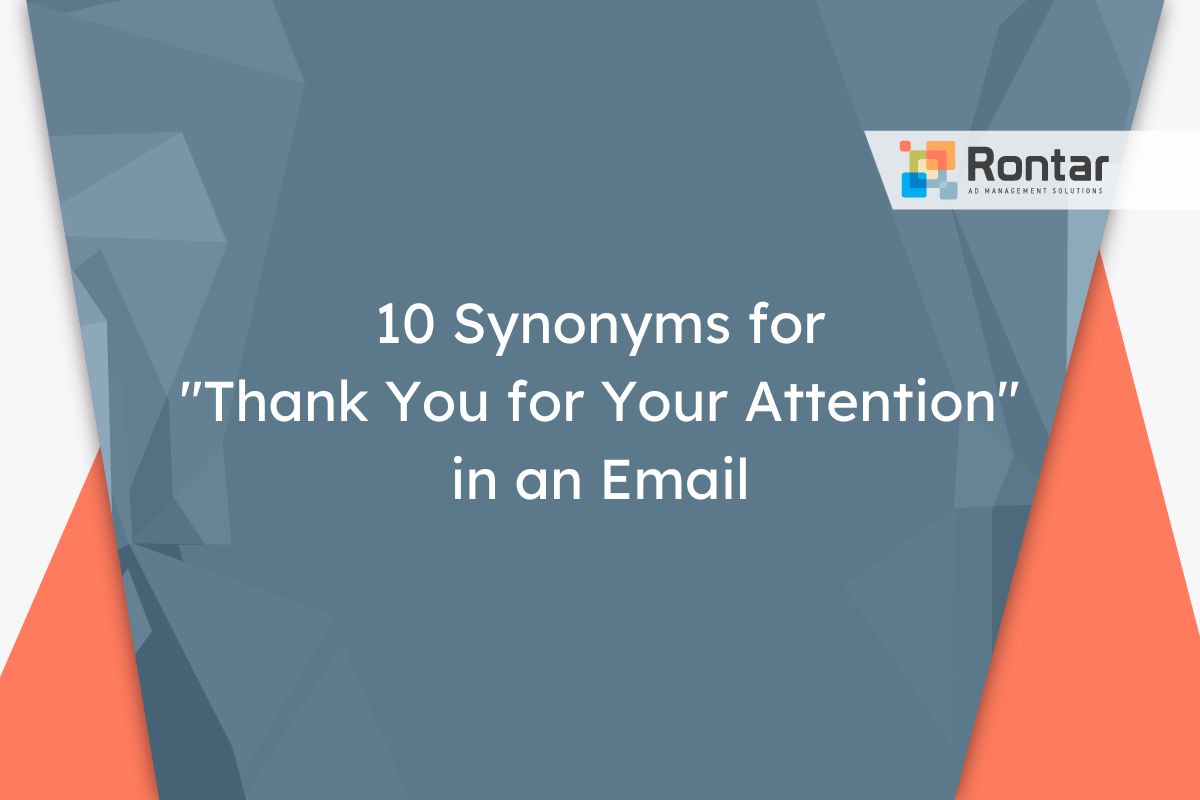“Thank You for Your Attention” is an expression we often hear. It is polite and shows gratitude.
But what does it really mean? Why is it so important in our daily interactions? In today’s fast-paced world, getting someone’s full attention is rare. Everyone is busy with their own tasks and distractions. Acknowledging someone’s attention is a simple yet powerful gesture.
It shows respect and appreciation. It can make the listener feel valued and respected. This phrase helps build strong relationships, whether in personal or professional settings. In this blog post, we will explore the significance of thanking someone for their attention and how it can positively impact our communication.

Credit: www.freepik.com
Power Of Gratitude
The power of gratitude cannot be understated. It can transform lives. Expressing thanks is more than good manners. It impacts our mental well-being and relationships. Thanking someone for their attention has deep significance.
Psychological Benefits
Gratitude boosts mental health. It reduces stress and increases happiness. Feeling grateful helps people sleep better. It lowers anxiety and depression. Practicing gratitude can lead to a more positive outlook on life. Simple thank yous can make a big difference.
Impact On Relationships
Thanking others strengthens bonds. It shows appreciation and respect. People feel valued when they are thanked. This builds trust and loyalty. Relationships grow stronger with mutual gratitude. Saying thank you can resolve conflicts. It fosters a sense of community and belonging.

Credit: www.freepik.com
Gratitude In The Workplace
Gratitude in the workplace can transform the environment. A simple “thank you” can boost morale and strengthen team bonds. Recognizing the efforts of colleagues fosters a positive atmosphere. It encourages everyone to work together harmoniously.
Employee Morale
Thanking employees can significantly improve their morale. Feeling appreciated motivates them to perform better. They become more engaged and enthusiastic about their work. This positive energy spreads throughout the team. It creates a supportive and cheerful workplace.
Team Collaboration
Expressing gratitude enhances team collaboration. Acknowledging contributions makes everyone feel valued. It encourages open communication and mutual respect. Teams that appreciate each other work more effectively together. They solve problems faster and innovate more creatively.
Customer Engagement
Engaging with customers is vital for any business. It helps create a connection with them. This bond can lead to long-term relationships. Focusing on customer engagement can bring numerous benefits. Here, we will explore how saying “Thank You for Your Attention” enhances customer engagement.
Building Loyalty
Customer loyalty is a crucial aspect of business. A simple “Thank You” can make customers feel valued. This small gesture can lead to repeat business.
Consider these practices to build loyalty:
- Send personalized thank you notes.
- Offer exclusive deals to loyal customers.
- Show appreciation during special occasions.
These actions can turn a one-time buyer into a loyal customer. Building loyalty can also lead to word-of-mouth marketing. Satisfied customers often share their positive experiences.
Enhancing Satisfaction
Customer satisfaction should always be a priority. A thank you message can enhance satisfaction. It shows you care about their experience.
Here are some tips to enhance satisfaction:
| Action | Benefit |
|---|---|
| Follow up after a purchase | Shows customers you value their feedback |
| Resolve issues quickly | Improves trust and satisfaction |
| Offer helpful information | Empowers customers and enhances their experience |
Enhancing satisfaction leads to happier customers. Happy customers are likely to return. They are also more likely to recommend your business to others.
Educational Settings
In educational settings, saying “Thank you for your attention” can have a significant impact. It can boost student motivation and strengthen teacher-student relationships. Let’s explore how these simple words can make a difference.
Student Motivation
Student motivation is crucial for effective learning. When teachers say “Thank you for your attention,” it shows appreciation. This can encourage students to stay engaged and participate more actively. It creates a positive learning environment.
Here are some ways to enhance student motivation:
- Acknowledge students’ efforts.
- Provide constructive feedback.
- Offer praise for their achievements.
Using these methods can help maintain high levels of motivation. It ensures students feel valued and supported.
Teacher-student Relationships
Teacher-student relationships play a vital role in educational success. A simple “Thank you for your attention” can build trust and rapport. It shows students that their presence and focus matter.
To strengthen these relationships, consider the following:
- Communicate openly and honestly.
- Show empathy and understanding.
- Be approachable and supportive.
By following these steps, teachers can foster a more inclusive and respectful classroom environment.
Social Media Influence
Social media plays a big role in connecting with your audience. It’s a powerful tool to increase visibility and build relationships. Thanking your followers can have a positive impact on your social media presence.
Increasing Followers
Thanking your audience can help you gain more followers. It shows you appreciate their support. People like to follow accounts that value their presence. A simple “thank you” can make your followers feel special. This encourages them to share your content with others. More shares lead to more followers.
| Action | Result |
|---|---|
| Saying “Thank You” | Increased follower engagement |
| Showing Appreciation | More shares |
| Engaging with Comments | Higher follower count |
Boosting Interaction
Interaction is key to a strong social media presence. When you thank your followers, they are more likely to interact with your posts. This can include liking, commenting, and sharing. Engaged followers can help your content reach a wider audience. Here are some ways to boost interaction:
- Reply to Comments: Show your followers you care by replying to their comments. This makes them feel valued and encourages more interaction.
- Ask Questions: Engage your audience by asking questions. This can lead to more comments and discussions.
- Share User-Generated Content: Show appreciation by sharing content created by your followers. This can boost their engagement and encourage others to do the same.
By showing gratitude and engaging with your followers, you can build a loyal community. This can lead to more interactions and a stronger social media presence.
Daily Practices
Thanking someone for their attention fosters positive relationships. It also promotes a healthy mindset. Here are some daily practices to help you make gratitude a habit.
Gratitude Journals
Keeping a gratitude journal is an effective way to focus on the positive aspects of your life. Each day, write down three things you are grateful for. This simple act can shift your mindset from negative to positive.
To make it easier, keep your journal by your bed. Write in it each morning or before you sleep. This habit will help you start and end your day on a positive note.
Expressing Thanks
Saying thank you is a powerful practice. It not only makes others feel appreciated but also boosts your mood. Try to thank at least one person each day. It can be a friend, family member, or even a stranger.
Here are some ways to express thanks:
- Write a thank you note.
- Send a quick text message.
- Give a sincere compliment.
- Offer a helping hand.
Even small gestures can make a big difference. Consistent practice of expressing thanks can strengthen your relationships and improve your overall well-being.
Scientific Research
Scientific research has shown that expressing gratitude can have numerous benefits for mental and physical health. Studies have focused on understanding how gratitude impacts our brains and behavior. This section delves into the latest scientific findings on gratitude.
Studies On Gratitude
Research shows that practicing gratitude can improve well-being. People who regularly express gratitude report feeling happier and more satisfied with their lives. Studies also indicate that gratitude can reduce symptoms of depression and anxiety.
Gratitude interventions, such as keeping a gratitude journal, have been found to enhance mental health. In one study, participants who wrote about things they were grateful for each week experienced fewer physical ailments and spent more time exercising.
| Study | Findings |
|---|---|
| Emmons & McCullough (2003) | Participants who wrote gratitude journals exercised more and had fewer illnesses. |
| Seligman et al. (2005) | People who wrote letters of gratitude showed increased happiness scores. |
Neuroscience Insights
Neuroscience has begun to uncover how gratitude affects the brain. Studies using brain imaging techniques show that gratitude activates regions of the brain associated with reward and motivation. These areas include the medial prefrontal cortex and the anterior cingulate cortex.
Gratitude also appears to boost the production of dopamine and serotonin. These neurotransmitters are linked to feelings of pleasure and happiness. By increasing the release of these chemicals, gratitude can enhance mood and overall well-being.
Brain studies have also found that practicing gratitude can improve sleep quality. Better sleep can lead to improved cognitive function and emotional regulation.
- Medial Prefrontal Cortex: Involved in decision-making and social interactions.
- Anterior Cingulate Cortex: Plays a role in emotional processing.
- Dopamine: A neurotransmitter associated with pleasure and reward.
- Serotonin: A neurotransmitter that contributes to well-being and happiness.
Incorporating gratitude into daily routines can have lasting positive effects on the brain. This can lead to a healthier and happier life.
Challenges And Solutions
Expressing gratitude for someone’s attention may seem simple. But it comes with its own set of challenges. Let’s delve into the main hurdles you may face. Along with practical solutions to address them.
Overcoming Negativity
Negativity can dampen the impact of your gratitude message. Negative comments or experiences can overshadow your appreciation. Here are some strategies to overcome this:
- Focus on Positivity: Highlight the positive aspects of your message. This can shift the focus away from negativity.
- Be Specific: Mention what you are thankful for. Specificity makes your gratitude genuine and impactful.
- Stay Calm: Respond to negative feedback calmly. A calm demeanor can defuse tension and maintain the focus on your gratitude.
Maintaining Consistency
Consistency is key to expressing gratitude effectively. Inconsistent messages can confuse your audience. Here’s how to maintain consistency:
- Set a Schedule: Plan regular intervals for your gratitude messages. This keeps your appreciation consistent.
- Use Templates: Create templates for your messages. Templates ensure a consistent tone and format.
- Track Responses: Monitor how your audience responds. Tracking helps you adjust and maintain consistent engagement.
By addressing these challenges, you can convey your gratitude more effectively. Positive and consistent messages can strengthen your connection with your audience.

Credit: grammarcove.com
Frequently Asked Questions
What Does “thank You For Your Attention” Mean?
“Thank You for Your Attention” is an expression of gratitude. It acknowledges the listener’s or reader’s focus and engagement. This phrase is commonly used at the end of presentations or speeches.
When Should You Say “thank You For Your Attention”?
You should say “Thank You for Your Attention” at the end of a presentation or speech. It signifies that you appreciate the audience’s focus. It can also be used in written communication to show gratitude.
Is “thank You For Your Attention” Formal?
Yes, “Thank You for Your Attention” is a formal expression. It is suitable for professional settings. It is often used in business presentations, academic lectures, and formal speeches.
Can “thank You For Your Attention” Be Used In Emails?
Yes, “Thank You for Your Attention” can be used in emails. It is appropriate for formal emails. It shows appreciation for the recipient’s time and focus.
Conclusion
Thank you for reading our blog post. Your attention means a lot to us. We hope you found the information helpful. Stay tuned for more interesting topics. Feel free to share your thoughts in the comments. We value your feedback.
Have a great day ahead!
